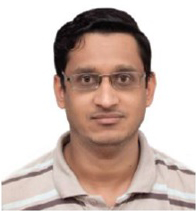A thorough understanding of propagation and radiation of electromagnetic waves in both wired and wireless media is important in many fields such as microwave and RF engineering, antennas, wireless communications, and fiber-optics. In this course, we discuss guided electromagnetic wave propagation in transmission lines and metallic waveguides, light propagation in optical waveguides, fibers, and free-space. In the final part of the course, we cover basic concepts of antennas and channel models for wireless communications. Pre-requisites include familiarity with vector analysis and vector calculus, electrostatics, and magnetostatics. Assignments include both conceptual and computational problems.
INTENDED AUDIENCE : Undergraduate students and first year graduate students
PREREQUISITES : Vector analysis, Electrostatics, and Magnetostatics
INDUSTRY SUPPORT : Of interest to all companies that deal with electromagnetic waves and wireless communications. In addition, DRDO, ISRO, etc will value the course

DOWNLOAD APP
FOLLOW US